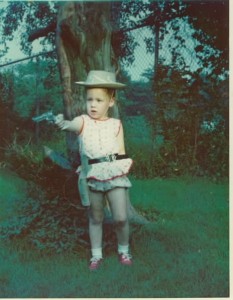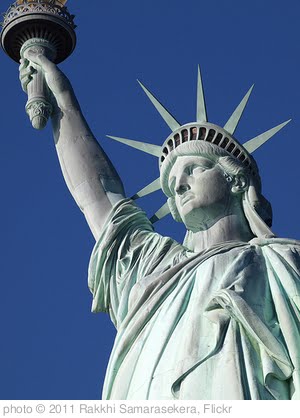Prayer
Wall Street has been devastating Main Street for some time. And when the politicians -- most of them bought by Wall Street -- say nothing, it's called "responsible economics." But when somebody, anybody, complains about people suffering and that the political deck in official Washington has been stacked in favor of Wall Street, the accusation of class warfare quickly emerges. "Just who do these people think they are," they ask. The truth is that the people screaming about class warfare this week aren't really concerned about the warfare. They're just concerned that their class -- or the class that has bought and paid for their political careers -- continues to win the war.
So where is God in all of this? Is God into class warfare? No, of course not. God really does love us all, sinners and saints alike, rich and poor, mansion dwellers and ghetto dwellers. But the God of the Bible has a special concern for the poor and is openly suspicious of the rich. And if that is not clear in the Bible nothing is.
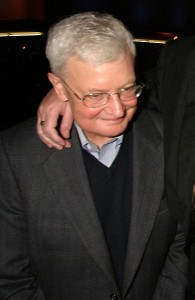 "I have no interest in megachurches with jocular millionaire pastors," Ebert writes. "I think what happens in them is sociopolitical, not spiritual. I believe the prosperity gospel tries to pass through the eye of the needle. I believe it is easier for a Republican to pass through the eye of a needle than for a camel to get into heaven. I have no patience for churches that evangelize aggressively.
"I have no interest in megachurches with jocular millionaire pastors," Ebert writes. "I think what happens in them is sociopolitical, not spiritual. I believe the prosperity gospel tries to pass through the eye of the needle. I believe it is easier for a Republican to pass through the eye of a needle than for a camel to get into heaven. I have no patience for churches that evangelize aggressively.
"I have no interest in being instructed in what I must do to be saved. I prefer vertical prayers, directed up toward heaven, rather than horizontal prayers, directed sideways toward me," he continued. "If we are to love our neighbors as ourselves, we must regard their beliefs with the same respect our own deserve."
And I'll be your new tour guide here at God's Politics.
Some of you may know me by my more official byline, Cathleen Falsani. I've been a contributing editor and columnist for Sojourners Magazine for several years now, writing a column every other month called "Godstuff" and also have contributed from time to time to this'a'here blog.
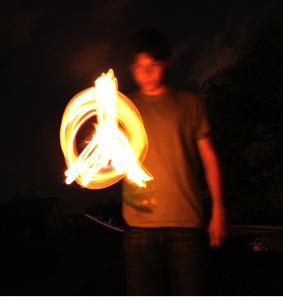 I say a ceasefire can and also ought to mean that we will hold our peace, hold our tongues, intentionally muzzle ourselves, become mute in a discussion that can much too easily descend into verbal warfare. Often, when we are quiet in the face of verbal attack, the argument does not escalate into something that all parties involved will regret.
I say a ceasefire can and also ought to mean that we will hold our peace, hold our tongues, intentionally muzzle ourselves, become mute in a discussion that can much too easily descend into verbal warfare. Often, when we are quiet in the face of verbal attack, the argument does not escalate into something that all parties involved will regret.
One little known fact about Houston is that it was the only major city in the South to integrate nonviolently. A meeting was held in a downtown hotel with key African-American leaders -- preachers, business owners, barbers, undertakers -- and the business and political power players from Houston's white establishment. The meeting determined that Houston would integrate silently and sit-ins would end -- no newspaper articles, no television cameras. They were simply going to change the rules of the game; and they did without any violence. It was a meeting that represented how Houston politics happen: provide a room, bring together community leaders, business interests and politicians, and get a deal done. Such meetings certainly make for strange gatherings, but at critical junctures in our city's history this mixture has proven to be a winning cocktail.
When I was growing up, there was a house down the street from us which had slightly tattered window coverings and the front lawn was like a graveyard of broken things. Posted on the fence was a "No trespassing" sign. I remember asking my mother what trespassing was so I could be certain not to do it to anyone who lived in that weird house. When she explained that it meant going into their yard uninvited I thought, no problem. Soon after that, when I first learned the Lord's Prayer, I thought it was weird that out of all the sins that Jesus would suggest we ask God to forgive it would be our trespassing. I pretty much made it a policy to stay out of strange yards, and since no one seemed to wander into ours uninvited, I thought I was covered. Only later did I realize that trespassing was only one of countless was to trespass against others. And now I get it -- kind of. Forgive us our sins as we forgive those who sin against us. Jesus always seems to be pairing God's forgiveness of us with our forgiveness of others.
Each moment is pregnant with new possibilities waiting to be born, alive with new beginnings, God's secrets not yet heard, God's dreams not yet fulfilled. These were the thoughts that lodged in my mind as I meditated on Isaiah 48:6-8 this morning. So many good Christian people I talk to are afraid that their prayer life will become stale, their spiritual disciplines empty rituals. Some make this an excuse for their lack of discipline in prayer. And prayer does become stale and meaningless if we don't know how to stir our imaginations and awaken our creativity to new thoughts, new patterns and new possibilities for prayer.
Tools for prayer are creative opportunities not formulae for success
One of my greatest fears as I continue to share these tools for prayers is that some of my readers will see them as another formula that will make them more successful and more prayerful. Of course that is possible, but what I hope is that we will all see these as tools as ways to stir our imaginations and open our minds to new ways to express the prayers God has placed in our hearts, stimuli that awaken our creativity to the brand new possibilities of ways that God can speak to us, in us, and through us.
The comment code of conduct for the God's Politics blog includes familiar commitments to civility, courtesy, and respect, and even connects these pledges to biblical passages. But what if we went a step further in our understanding of blog comments -- and, for that matter, all of our online communication? What if we recognized our forays into online commentary as doing theological work?
Karl Barth invites that kind of thinking in his 1963 Evangelical Theology: An Introduction. In his chapter on the "community" -- a word that he argues is, theologically speaking, much better than "church" to describe the body of believers -- Barth makes the case that each member of the community of faith has the responsibility to bear witness to the Word. We do so, Barth says, in our very existence, in our service to "the handicapped, weak, and needy" in the world, and in our prayer. The community also does so in spoken and written words by which it "attempts to make its faith audible."
More than 140 prominent Protestant leaders from 12 Latin American countries have signed an "open letter to the Christian churches of the United States," asking American Christians to stand with "the most vulnerable members of US society" who would be affected by proposed budget cuts to the social safety net.
Citing the Circle of Protection as a positive Christian witness, the signers also expressed their dismay. "We view with deep concern recent decisions in the United States that will add to the suffering of the most vulnerable members of US society," the letter read. It was signed by a broad array of Latin American religious communities, including leaders of the Latin American Council of Churches, the United Bible Society of Latin America, evangelical councils and alliances in Peru, Ecuador, Honduras, Argentina, Brazil, Bolivia, and Uruguay, the Fellowship of Evangelical Churches (CONELA), the Association of Reformed and Presbyterian Churches of Latin America (AIPRAL), Micah Network, Indigenous Association of Peruvian Amazonia, and the Latin American Biblical University in Costa Rica.
Yesterday afternoon I found out that ABC news plans to dedicate it programming today to "Hunger at Home: Crisis in America." It precipitated my writing of this post which I had planned to add as a later addition to a series on tools for prayer.
One important item in our prayer toolkit is knowledge of our hurting world. Not knowledge for the sake of knowledge, but knowledge that equips us to respond. Becoming aware of the needs in our world can lead us into a deeper understanding of the ache in God's heart for our hurting friends and neighbors. It can also connect us to our own self-centered indifference that often makes us complacent when God wants us to be involved. And it can stimulate us to respond to situations that we once felt indifferent to.
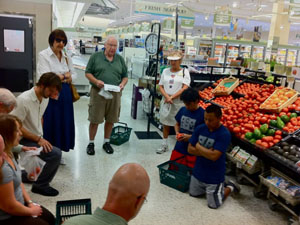 To the farmers who grow our food, the harvesters who pick it, the transporters who bring it to market, the grocers who present it, and the cooks who prepare it.
To the farmers who grow our food, the harvesters who pick it, the transporters who bring it to market, the grocers who present it, and the cooks who prepare it.
Here's the prayer we prayed at a nearby Publix grocery in the produce section on Friday:
A Prayer for Publix
Living God, you are the Creator of this beautiful and fertile world. You made sun, rain, soil, air, seed, and seasons. We praise you for the green of lettuce, the yellow of lemon, the orange of a tangerine, and especially for the bright red of a tomato. They are beautiful to our eyes, delicious to our taste buds, and nourishing to our bodies. We pray to the Lord, Lord, hear our prayer.
Many people remember "O God, Our Words Cannot Express," a hymn written on the afternoon of September 11, 2001. The hymn was quickly shared by email and Web postings (it is still on over 10,000 websites); it was used by many churches on that evening and in the days that followed. The hymn was featured in newspaper stories, radio programs, twice on national PBS-TV, and on BBC-TV in the United Kingdom. YouTube has the Church World Service music video by Emmy winner Pete Staman of this hymn being sung by Noel Paul Stookey (of "Peter, Paul & Mary") with the Northfield Mount Herman School Choir.
The new posting of this interfaith hymn includes a revised version for the 10th anniversary. Also included is "God, We've Known Such Grief and Anger", a hymn lifting up Christian hope in the face of disaster that was written for the first year anniversary of 9/11. Last week I wrote a new hymn for the tenth anniversary of September 11 with an emphasis on working for peace and justice for all.
Lean and lanky, the 30-something teacher probed the congregation with a practiced eye as he wound down his presentation. Ezekiel, or "Zeke" (pseudonym), teaches at a secondary school in another country. Backed up by a carefully constructed PowerPoint presentation, Ezekiel shared his passion for sensitively pouring truth and grace into the lives of his students, particularly the girls. His blue eyes blazed as he asked if a woman in the Community Christian Church (not its real name) congregation would be willing to come forward and pray for the women of his host country.
No one moved.
 Whenever I give talks on the effects of the Israeli occupation on Palestinian livelihood, the status of nonviolence as a means to resisting the occupation, and how I believe nonviolence is the only way to move forward to resolve the conflict and create a lasting peace between Israelis and Palestinians, one of the first and immediate questions I get from foreign visitors to my office in Bethlehem is, What you said is good, but what about the Muslims? Do they also believe in nonviolence? Do they understand it?" Even if I don't mention religion in my presentation -- and I rarely do -- this question always seems to make its way in our discussions.
Whenever I give talks on the effects of the Israeli occupation on Palestinian livelihood, the status of nonviolence as a means to resisting the occupation, and how I believe nonviolence is the only way to move forward to resolve the conflict and create a lasting peace between Israelis and Palestinians, one of the first and immediate questions I get from foreign visitors to my office in Bethlehem is, What you said is good, but what about the Muslims? Do they also believe in nonviolence? Do they understand it?" Even if I don't mention religion in my presentation -- and I rarely do -- this question always seems to make its way in our discussions.
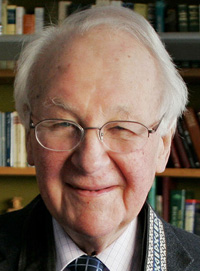 [Editors' note: Rev. John Stott, one of the world's most influential evangelical figures over the past half-century, died this Wednesday at age 90. Rev. Stott served as a contributing editor for Sojourners magazine, when we were known as The Post American, and wrote this article for the November/December, 1973 issue of the magazine. We will always remember Rev. Stott for his profound contributions to our community and the Church.]
[Editors' note: Rev. John Stott, one of the world's most influential evangelical figures over the past half-century, died this Wednesday at age 90. Rev. Stott served as a contributing editor for Sojourners magazine, when we were known as The Post American, and wrote this article for the November/December, 1973 issue of the magazine. We will always remember Rev. Stott for his profound contributions to our community and the Church.]
It seems to be a characteristic of the Anglo-Saxon mind to enjoy inhabiting the "polar regions" of truth. If we could straddle both poles simultaneously, we would exhibit a healthy balance. Instead, we tend to "polarize". We push some of our brothers to one pole, while keeping the other as our own preserve.
What I am thinking of now is not so much questions of theology as questions of temperament, and in particular the tension between the "conservative" and the "radical."
There's something special about the bookends of our lifetimes. I became a first-time father seven months ago and a hospice chaplain just one month past. Growing up and growing old, especially the first and last months of our lives, can be surprisingly similar experiences.
I fed my daughter sweet potatoes for the first time last night. Introducing her to solid foods has been a treat. While we're trying our best to teach her the sign language words for "food", "more", and " all done", Robin still finds closed-mouth grumble-whines to be the best way to let us know she thinks sweet potatoes aren't all that hot. Another subtly nuanced whine might instead wonder, "You don't happen to have any more mashed banana or applesauce around, would you?" My attempt to turn the filled spoon into an acrobatic and roaring airplane met with scant success.
Shakespeare said a rose by any other name would smell as sweet. Maybe, but a Stink Rose by any other name (say... garlic?) might get more play.
On July 19, Campus Crusade for Christ announced its plan to officially change its name to Cru in early 2012.
Brown v. Board of Education had not yet been fought in the Supreme Court when Bill and Vonetta Bright christened their evangelical campus-based ministry Campus Crusade for Christ in 1951. The evangelical church context was overwhelmingly white, middle class, and suburban. The nation and the church had not yet been pressed to look its racist past and present in the face. The world had not yet been rocked by the international fall of colonialism, the rise of the Civil Rights movement, the disillusionment of the Vietnam War, the burnt bras of the women's liberation movement, the fall of the Berlin Wall, or the rise of the Black middle class (more African Americans now live in the suburbs than in inner cities). In short, theirs was not the world we live in today. So, the name Campus Crusade for Christ smelled sweet. Over the past 20 years, though, it has become a Stink Rose ... warding off many who might otherwise have come near.
"I will call them my people, who were not my people. And her beloved, who was not beloved." (Romans 9:25 referencing Hosea 2:23)
Estranged, alienated, and removed; anyone living in an industrialized modern society in the 21st century would be able to define, or at least identify the sentiments of these words. Our time is one of mass communication and instantaneous access to knowledge. And yet our lives are too compartmentalized, increasingly divided, and our society reflects this. Indeed the existential writers of yesteryear were correct in diagnosing the iron cage that would befall us, ultimately leading to an eclipse of reason.

So as I watched the final Hogwarts Express depart from Platform 9¾ in Harry Potter and the Deathly Hallows, Part II this past weekend (slightly teary-eyed, I confess), I started to wonder: What might it sound like to pray in the language of Harry Potter -- language that clearly resonates with folks around the world? Would it be cheesy? Probably. Profane? Perhaps. But I figured the God who relied on earthly parables about wineskins and fig trees to explain the Kingdom would understand.
